外研版(2019)选择性必修第一册 Unit 2 Onwards and upwardsDeveloping ideas 课件 (共31张PPT,内嵌视频)
文档属性
| 名称 | 外研版(2019)选择性必修第一册 Unit 2 Onwards and upwardsDeveloping ideas 课件 (共31张PPT,内嵌视频) | 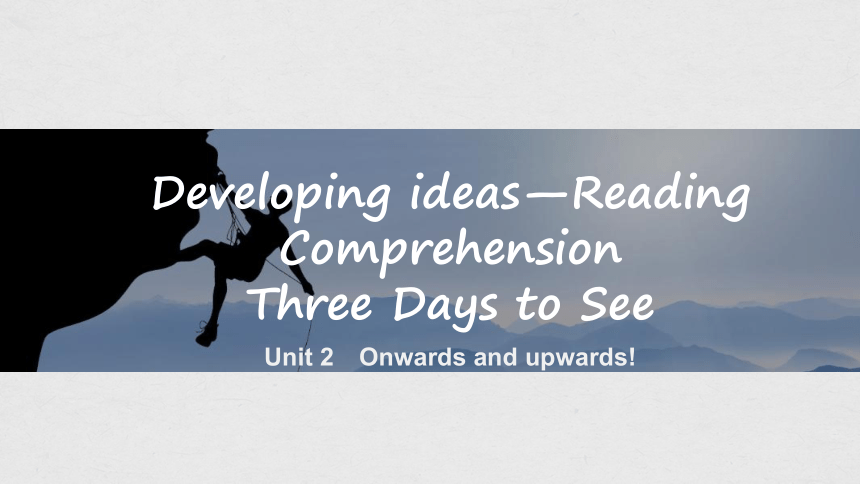 | |
| 格式 | pptx | ||
| 文件大小 | 45.5MB | ||
| 资源类型 | 教案 | ||
| 版本资源 | 外研版(2019) | ||
| 科目 | 英语 | ||
| 更新时间 | 2024-04-30 14:56:00 | ||
图片预览

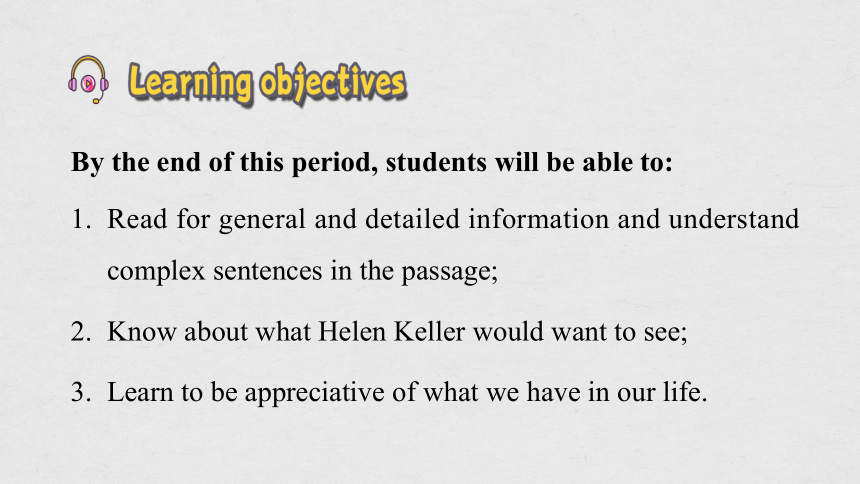
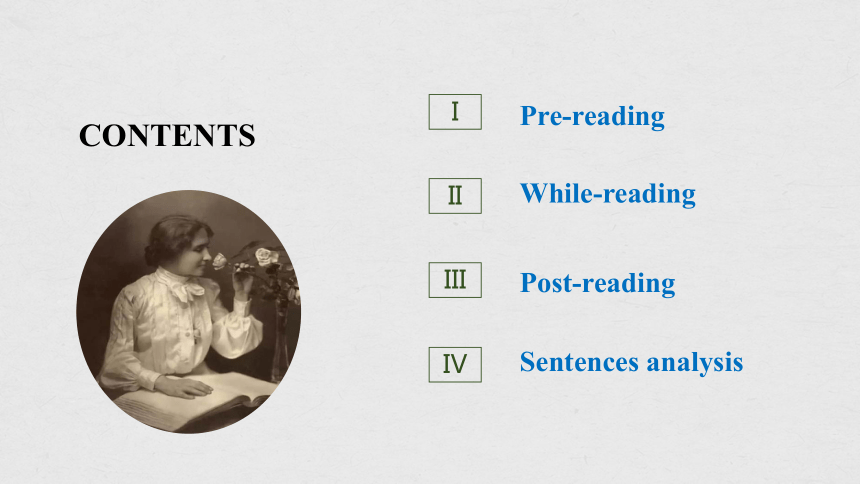
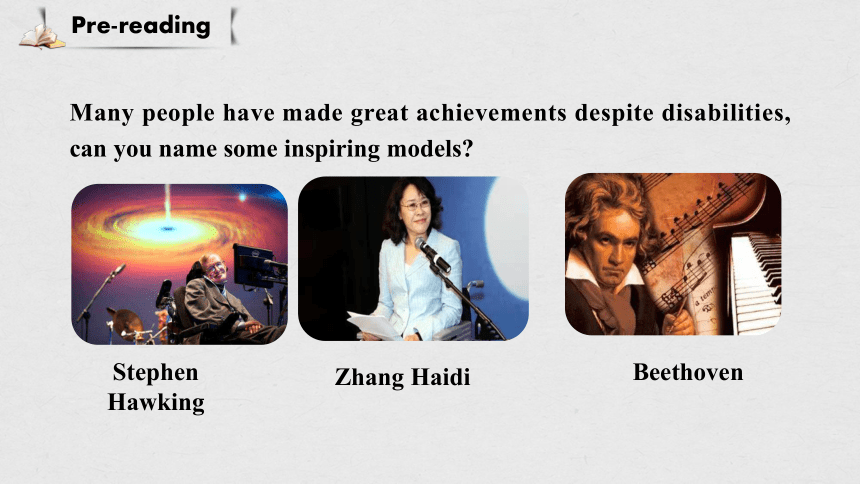
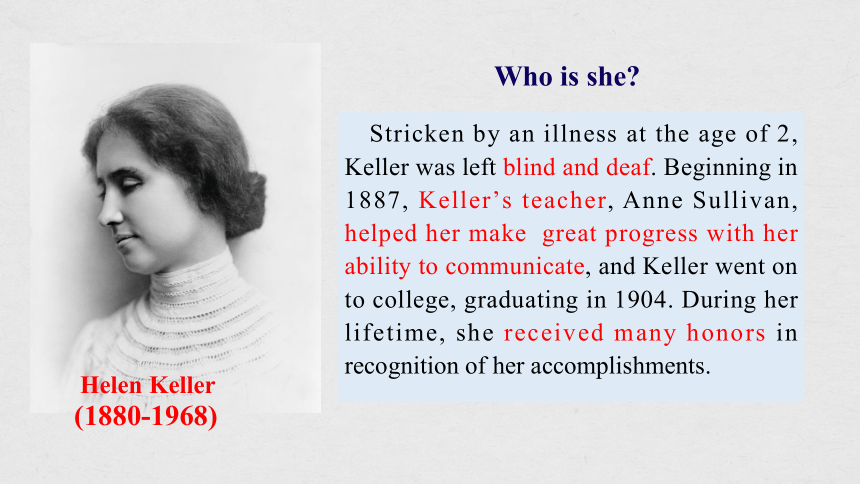
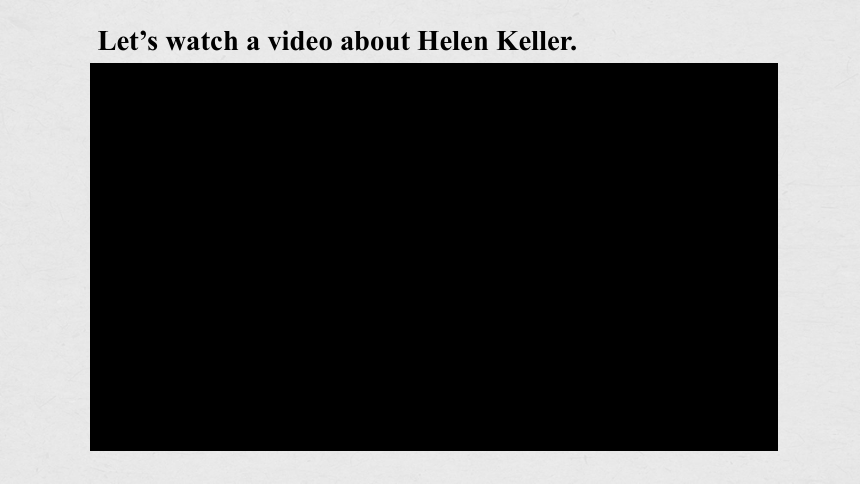
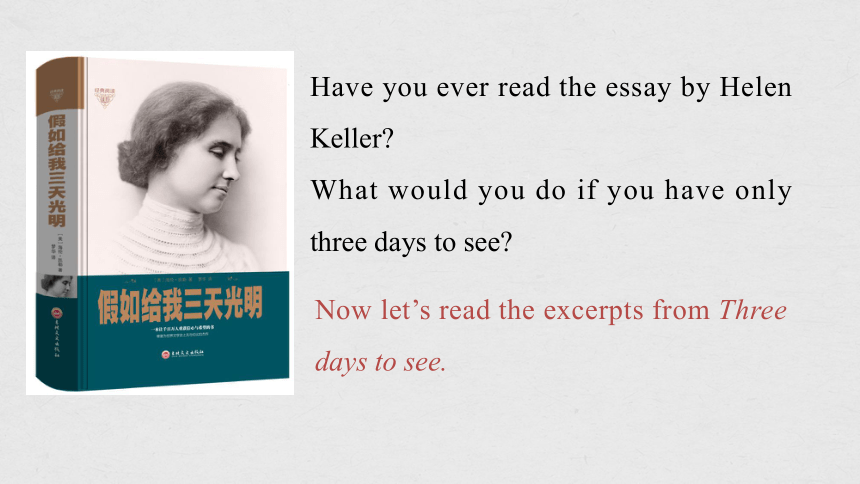
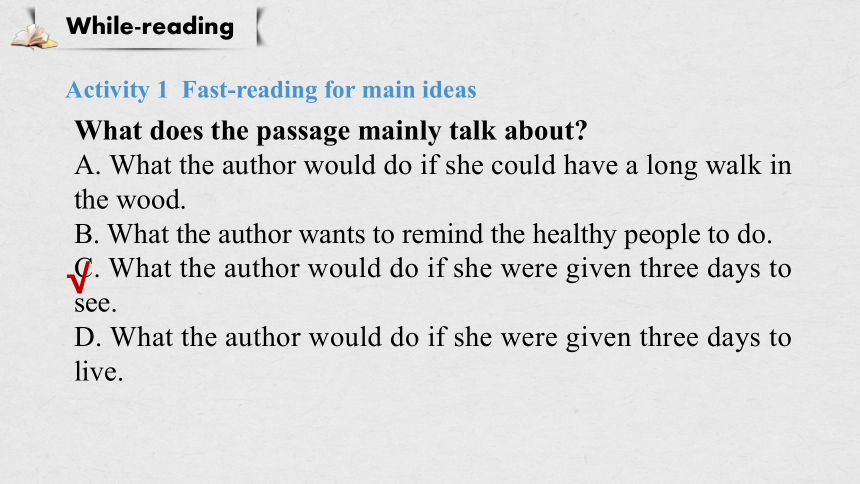
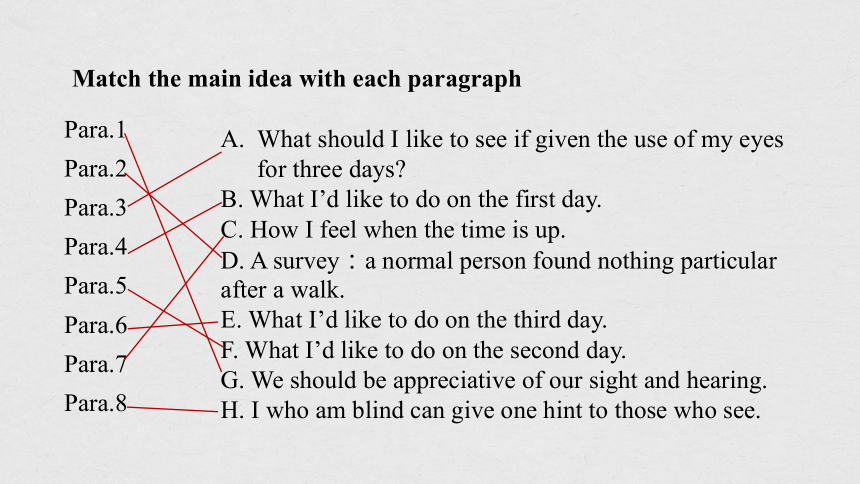

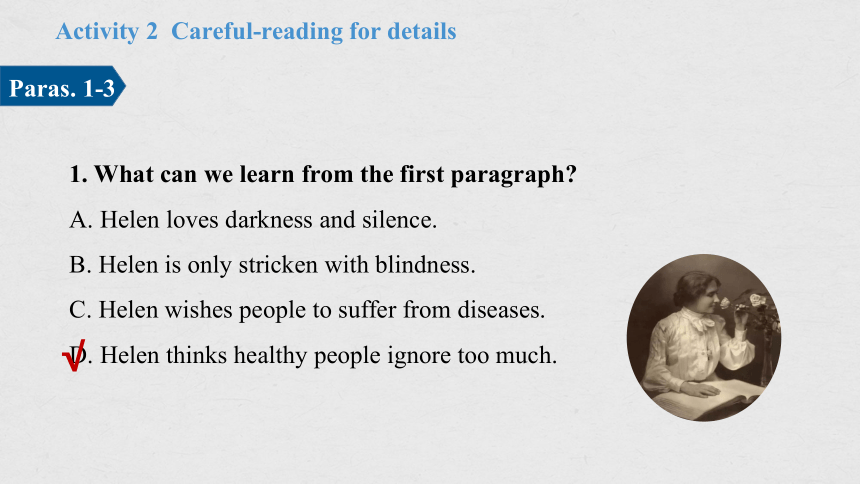
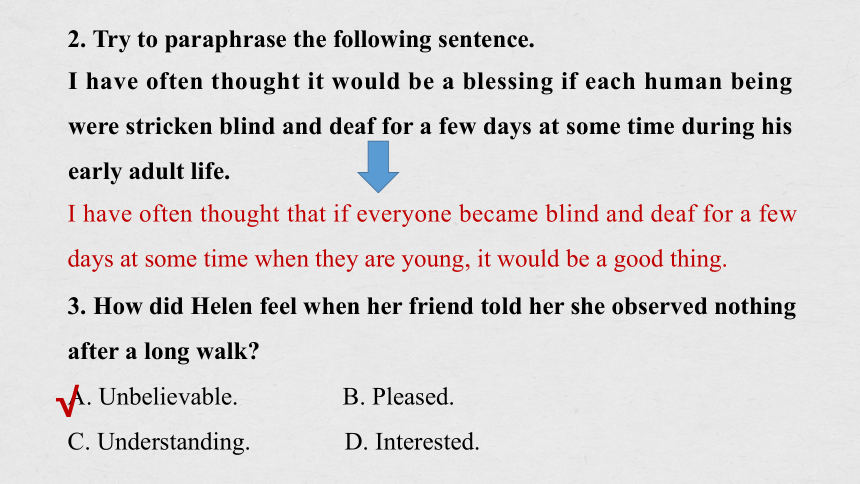
文档简介
(共31张PPT)
Unit 2 Onwards and upwards!
Developing ideas—Reading Comprehension
Three Days to See
By the end of this period, students will be able to:
Read for general and detailed information and understand complex sentences in the passage;
Know about what Helen Keller would want to see;
Learn to be appreciative of what we have in our life.
CONTENTS
Pre-reading
I
While-reading
II
Post-reading
III
Sentences analysis
IV
Stephen Hawking
Beethoven
Zhang Haidi
Pre-reading
Many people have made great achievements despite disabilities, can you name some inspiring models
Helen Keller
(1880-1968)
Blind
Deaf
Famous
author and lecturer
Stricken by an illness at the age of 2, Keller was left blind and deaf. Beginning in 1887, Keller’s teacher, Anne Sullivan, helped her make great progress with her ability to communicate, and Keller went on to college, graduating in 1904. During her lifetime, she received many honors in recognition of her accomplishments.
Who is she
Let’s watch a video about Helen Keller.
Have you ever read the essay by Helen Keller
What would you do if you have only three days to see
Now let’s read the excerpts from Three days to see.
While-reading
What does the passage mainly talk about
A. What the author would do if she could have a long walk in the wood.
B. What the author wants to remind the healthy people to do.
C. What the author would do if she were given three days to see.
D. What the author would do if she were given three days to live.
Activity 1 Fast-reading for main ideas
√
Match the main idea with each paragraph
Para.1
Para.2
Para.3
Para.4
Para.5
Para.6
Para.7
Para.8
What should I like to see if given the use of my eyes for three days
B. What I’d like to do on the first day.
C. How I feel when the time is up.
D. A survey:a normal person found nothing particular after a walk.
E. What I’d like to do on the third day.
F. What I’d like to do on the second day.
G. We should be appreciative of our sight and hearing.
H. I who am blind can give one hint to those who see.
Part 1 (Paras.____):
The author’s eagerness___________.
Part 2 (Paras.______): _______________________________________.
Part 3 (Para.____):
A hint given by the author to healthy people —____________________.
How is the passage
organized
Structure
1-3
4-7
What the author would see during the three days
8
to see
treasure what you have
Paras. 1-3
1. What can we learn from the first paragraph
A. Helen loves darkness and silence.
B. Helen is only stricken with blindness.
C. Helen wishes people to suffer from diseases.
D. Helen thinks healthy people ignore too much.
Activity 2 Careful-reading for details
√
2. Try to paraphrase the following sentence.
I have often thought that if everyone became blind and deaf for a few days at some time when they are young, it would be a good thing.
I have often thought it would be a blessing if each human being were stricken blind and deaf for a few days at some time during his early adult life.
3. How did Helen feel when her friend told her she observed nothing after a long walk
A. Unbelievable. B. Pleased.
C. Understanding. D. Interested.
√
4. How does Paragraph 3 develop
A.By giving examples.
B.By making comparisons.
C.By asking questions.
D.By analyzing causes.
5. How did the author find hundreds of interesting things
A.By smelling. B.By touching.
C.By hearing. D.By feeling.
√
√
Paras. 4-7
1.Why would the author not be able to sleep on the first night
A. Because she would be disappointed.
B. Because she would be tired.
C. Because she would be excited.
D. Because she would be alone.
√
2. What made the author’s life worth living
A. People’s kindness and gentleness and companionship.
B. The eye which is the window of the soul.
C. The beauty of nature she likes best.
D. Books revealing human life and the human spirit.
√
3. Decide whether the following statements are true(T) or false(F).
(1)Keller thought that silence would teach a person the joys of sound.
(2)In the author’s view, hearing is the most delightful sense.
(3)Keller wished that she could see the kind people with her eyes.
(4) Keller wasn’t eager to discover the new delights.
F
F
T
T
4. Read the passage and find out what the author would do if she could see.
To see (1)______________
______________________
through the eyes.
To see
(2) ___________________
To take (3)____________
___________ and enjoy
(4)____________________
To go to (5)__________
and see (6)__________
_______________, probe into (7)_______________ through his art.
To see (8)____________
__________.
The third day
To greet (9)_______,
discover (10)______
________________.
To spend the third day (11)__________
_______________________________.
the people who made her life worth living
The second day
the books read to her
a long walk in
the woods
the beauties of nature
the museums
the pageant
of man’s progress
the soul of man
a movie or
a drama
the dawn
new
delights and beauty
observing
people in their
day -to -day life
The first day
Use your eyes as if tomorrow you would be stricken blind. And the same method can be applied to the other senses. Hear the music of voices, the song of a bird, the mighty strains of an orchestra, as if you would be stricken deaf tomorrow. Touch each object you want to touch as if tomorrow your tactile sense would fail.
Para. 8
1. What rhetorical device(修辞手法) does the author use in this paragraph
A.Metaphor(隐喻). B.Personification(拟人).
C.Parallelism(排比). D.Rhetorical question(反问).
√
2.What’s the purpose of the author to use the rhetorical device in this paragraph
To use the rhetorical device to remind readers to treasure their senses and make the best of them.
The use of parallelism in speech or writing allows speakers or writers to maintain a consistency within their work and creates a balanced flow of ideas. Moreover, parallelism can be used as a tool for persuasion.
The whole passage
1. What can we learn from the passage
A. Cherish what you have.
B. No pleasure without pain.
C. One cannot put back the clock.
D. A day without sunshine is like night.
2. Which word can NOT be used to describe the author
A. Optimistic. B. Pessimistic.
C. Positive. D. Determined.
√
√
Be respectful and patient. Someone who has a disability should be afforded the same amount of respect as anyone else.Remember the golden rule “treat others as you would like to be treated”.
Never talk down to someone with a disability.
Don’t use labels or offensive terms,especially in a casual way.
Put yourself in the position of someone with a disability.
Post-reading
Activity 1 Discussion
1.How should we interact with people with disabilities (Critical thinking)
2.What should we do if we were faced with difficulties or having disabilities (Creative thinking)
When faced with difficulties or having disabilities, we should be brave and positive. Never give up until we make it.
Cherish those you have in your life because you never know when they won’t be there anymore.
Reflection
I have often thought 1. ___ would be a blessing if each human being were stricken blind and deaf for a few days, for darkness would make him 2._______________(appreciative) of sight, and silence would teach him the joys of sound. Now and then I have tested my 3._______(see) friends to discover what they see, but they often told me they had observed nothing 4.___ particular. How was it possible If I can get so much 5.________(please) from touch, how much more beauty must be revealed by sight I have imagined what I should most like to see if I 6.____________(give) the use of my eyes for three days.
Activity 2 Summary
it
more appreciative
seeing
in
pleasure
were given
On the first day, I should want to see the people 7._________ kindness and gentleness and companionship have made my life worth 8. ______(live).On the second day, I should like to see the pageant of man’s progress, and I should go to the museums. On the third day, I shall spend in the workaday world, amid the haunts of men 9.________(go) about the business of life. At midnight permanent night would close in on me again. Only then should I realize how much I had left 10. _________(see).At last, my advice to people who see: Use your eyes as if tomorrow you would be stricken blind.
whose
living
going
unseen
1. I have often thought it would be a blessing if each human being were stricken blind and deaf for a few days at some time during his early adult life. (Para. 1 Line 1)
[句式分析] 此句为__________句,it would be a blessing...life 为______从句,其中使用了__________,对__________________进行了假设。
[自主翻译]
主从复合
宾语
我常常想,如果每个人在青年时期都有一段时间失明和失聪,那会是一件幸事。
虚拟语气
未发生的事情
Sentences Analysis
2. Recently, I asked a friend who had just returned from a long walk in the woods what she had observed. (Para.2 Line 2)
[句式分析] 此句为__________句,who引导______从句,先行词在从句中作________,故用关系代词who;what引导______从句。
[自主翻译]
主从复合
定语
宾语
主语
最近,我问一个在林子里散步了许久的朋友看到了什么。
3. On the first day, I should want to see the people whose kindness and gentleness and companionship have made my life worth living. (Para. 4 Line 1)
[句式分析] 此句为__________句,主句为:______;whose引导______从句,先行词在从句中作________,故用关系代词whose。
[自主翻译]
主从复合
定语
第一天,我想见见身边的人,他们用善良、温柔和陪伴使我的生命变得有价值。
定语
4. I do not know what it is to see into the heart of a friend through that “window of the soul”, the eye.(Para. 4 Line 4)
[句式分析] 此句为__________句,what引导_______从句,在从句中what作_____语,it是_________,动词不定式短语to see into...eye作___________。the eye为 __________, 对“window of the soul”进行解释说明。
[自主翻译]
主从复合
我无法理解通过“心灵的窗户”——眼睛,看透一个朋友的内心是怎样的感觉。
宾语
表
形式主语
同位语
真正的主语
5. Only when darkness had again descended upon me should I realize how much I had left unseen. (Para. 7 Line 1)
[句式分析] 此句为__________句,“only+状语从句”放在句首,主句用______________结构,句中how much引导_________从句。
[自主翻译]
主从复合
只有当黑暗再次降临时,我才意识到,我还有那么多没有看到。
宾语
部分倒装
Review what we have learnt and preview language points.
Homework
Unit 2 Onwards and upwards!
Developing ideas—Reading Comprehension
Three Days to See
By the end of this period, students will be able to:
Read for general and detailed information and understand complex sentences in the passage;
Know about what Helen Keller would want to see;
Learn to be appreciative of what we have in our life.
CONTENTS
Pre-reading
I
While-reading
II
Post-reading
III
Sentences analysis
IV
Stephen Hawking
Beethoven
Zhang Haidi
Pre-reading
Many people have made great achievements despite disabilities, can you name some inspiring models
Helen Keller
(1880-1968)
Blind
Deaf
Famous
author and lecturer
Stricken by an illness at the age of 2, Keller was left blind and deaf. Beginning in 1887, Keller’s teacher, Anne Sullivan, helped her make great progress with her ability to communicate, and Keller went on to college, graduating in 1904. During her lifetime, she received many honors in recognition of her accomplishments.
Who is she
Let’s watch a video about Helen Keller.
Have you ever read the essay by Helen Keller
What would you do if you have only three days to see
Now let’s read the excerpts from Three days to see.
While-reading
What does the passage mainly talk about
A. What the author would do if she could have a long walk in the wood.
B. What the author wants to remind the healthy people to do.
C. What the author would do if she were given three days to see.
D. What the author would do if she were given three days to live.
Activity 1 Fast-reading for main ideas
√
Match the main idea with each paragraph
Para.1
Para.2
Para.3
Para.4
Para.5
Para.6
Para.7
Para.8
What should I like to see if given the use of my eyes for three days
B. What I’d like to do on the first day.
C. How I feel when the time is up.
D. A survey:a normal person found nothing particular after a walk.
E. What I’d like to do on the third day.
F. What I’d like to do on the second day.
G. We should be appreciative of our sight and hearing.
H. I who am blind can give one hint to those who see.
Part 1 (Paras.____):
The author’s eagerness___________.
Part 2 (Paras.______): _______________________________________.
Part 3 (Para.____):
A hint given by the author to healthy people —____________________.
How is the passage
organized
Structure
1-3
4-7
What the author would see during the three days
8
to see
treasure what you have
Paras. 1-3
1. What can we learn from the first paragraph
A. Helen loves darkness and silence.
B. Helen is only stricken with blindness.
C. Helen wishes people to suffer from diseases.
D. Helen thinks healthy people ignore too much.
Activity 2 Careful-reading for details
√
2. Try to paraphrase the following sentence.
I have often thought that if everyone became blind and deaf for a few days at some time when they are young, it would be a good thing.
I have often thought it would be a blessing if each human being were stricken blind and deaf for a few days at some time during his early adult life.
3. How did Helen feel when her friend told her she observed nothing after a long walk
A. Unbelievable. B. Pleased.
C. Understanding. D. Interested.
√
4. How does Paragraph 3 develop
A.By giving examples.
B.By making comparisons.
C.By asking questions.
D.By analyzing causes.
5. How did the author find hundreds of interesting things
A.By smelling. B.By touching.
C.By hearing. D.By feeling.
√
√
Paras. 4-7
1.Why would the author not be able to sleep on the first night
A. Because she would be disappointed.
B. Because she would be tired.
C. Because she would be excited.
D. Because she would be alone.
√
2. What made the author’s life worth living
A. People’s kindness and gentleness and companionship.
B. The eye which is the window of the soul.
C. The beauty of nature she likes best.
D. Books revealing human life and the human spirit.
√
3. Decide whether the following statements are true(T) or false(F).
(1)Keller thought that silence would teach a person the joys of sound.
(2)In the author’s view, hearing is the most delightful sense.
(3)Keller wished that she could see the kind people with her eyes.
(4) Keller wasn’t eager to discover the new delights.
F
F
T
T
4. Read the passage and find out what the author would do if she could see.
To see (1)______________
______________________
through the eyes.
To see
(2) ___________________
To take (3)____________
___________ and enjoy
(4)____________________
To go to (5)__________
and see (6)__________
_______________, probe into (7)_______________ through his art.
To see (8)____________
__________.
The third day
To greet (9)_______,
discover (10)______
________________.
To spend the third day (11)__________
_______________________________.
the people who made her life worth living
The second day
the books read to her
a long walk in
the woods
the beauties of nature
the museums
the pageant
of man’s progress
the soul of man
a movie or
a drama
the dawn
new
delights and beauty
observing
people in their
day -to -day life
The first day
Use your eyes as if tomorrow you would be stricken blind. And the same method can be applied to the other senses. Hear the music of voices, the song of a bird, the mighty strains of an orchestra, as if you would be stricken deaf tomorrow. Touch each object you want to touch as if tomorrow your tactile sense would fail.
Para. 8
1. What rhetorical device(修辞手法) does the author use in this paragraph
A.Metaphor(隐喻). B.Personification(拟人).
C.Parallelism(排比). D.Rhetorical question(反问).
√
2.What’s the purpose of the author to use the rhetorical device in this paragraph
To use the rhetorical device to remind readers to treasure their senses and make the best of them.
The use of parallelism in speech or writing allows speakers or writers to maintain a consistency within their work and creates a balanced flow of ideas. Moreover, parallelism can be used as a tool for persuasion.
The whole passage
1. What can we learn from the passage
A. Cherish what you have.
B. No pleasure without pain.
C. One cannot put back the clock.
D. A day without sunshine is like night.
2. Which word can NOT be used to describe the author
A. Optimistic. B. Pessimistic.
C. Positive. D. Determined.
√
√
Be respectful and patient. Someone who has a disability should be afforded the same amount of respect as anyone else.Remember the golden rule “treat others as you would like to be treated”.
Never talk down to someone with a disability.
Don’t use labels or offensive terms,especially in a casual way.
Put yourself in the position of someone with a disability.
Post-reading
Activity 1 Discussion
1.How should we interact with people with disabilities (Critical thinking)
2.What should we do if we were faced with difficulties or having disabilities (Creative thinking)
When faced with difficulties or having disabilities, we should be brave and positive. Never give up until we make it.
Cherish those you have in your life because you never know when they won’t be there anymore.
Reflection
I have often thought 1. ___ would be a blessing if each human being were stricken blind and deaf for a few days, for darkness would make him 2._______________(appreciative) of sight, and silence would teach him the joys of sound. Now and then I have tested my 3._______(see) friends to discover what they see, but they often told me they had observed nothing 4.___ particular. How was it possible If I can get so much 5.________(please) from touch, how much more beauty must be revealed by sight I have imagined what I should most like to see if I 6.____________(give) the use of my eyes for three days.
Activity 2 Summary
it
more appreciative
seeing
in
pleasure
were given
On the first day, I should want to see the people 7._________ kindness and gentleness and companionship have made my life worth 8. ______(live).On the second day, I should like to see the pageant of man’s progress, and I should go to the museums. On the third day, I shall spend in the workaday world, amid the haunts of men 9.________(go) about the business of life. At midnight permanent night would close in on me again. Only then should I realize how much I had left 10. _________(see).At last, my advice to people who see: Use your eyes as if tomorrow you would be stricken blind.
whose
living
going
unseen
1. I have often thought it would be a blessing if each human being were stricken blind and deaf for a few days at some time during his early adult life. (Para. 1 Line 1)
[句式分析] 此句为__________句,it would be a blessing...life 为______从句,其中使用了__________,对__________________进行了假设。
[自主翻译]
主从复合
宾语
我常常想,如果每个人在青年时期都有一段时间失明和失聪,那会是一件幸事。
虚拟语气
未发生的事情
Sentences Analysis
2. Recently, I asked a friend who had just returned from a long walk in the woods what she had observed. (Para.2 Line 2)
[句式分析] 此句为__________句,who引导______从句,先行词在从句中作________,故用关系代词who;what引导______从句。
[自主翻译]
主从复合
定语
宾语
主语
最近,我问一个在林子里散步了许久的朋友看到了什么。
3. On the first day, I should want to see the people whose kindness and gentleness and companionship have made my life worth living. (Para. 4 Line 1)
[句式分析] 此句为__________句,主句为:______;whose引导______从句,先行词在从句中作________,故用关系代词whose。
[自主翻译]
主从复合
定语
第一天,我想见见身边的人,他们用善良、温柔和陪伴使我的生命变得有价值。
定语
4. I do not know what it is to see into the heart of a friend through that “window of the soul”, the eye.(Para. 4 Line 4)
[句式分析] 此句为__________句,what引导_______从句,在从句中what作_____语,it是_________,动词不定式短语to see into...eye作___________。the eye为 __________, 对“window of the soul”进行解释说明。
[自主翻译]
主从复合
我无法理解通过“心灵的窗户”——眼睛,看透一个朋友的内心是怎样的感觉。
宾语
表
形式主语
同位语
真正的主语
5. Only when darkness had again descended upon me should I realize how much I had left unseen. (Para. 7 Line 1)
[句式分析] 此句为__________句,“only+状语从句”放在句首,主句用______________结构,句中how much引导_________从句。
[自主翻译]
主从复合
只有当黑暗再次降临时,我才意识到,我还有那么多没有看到。
宾语
部分倒装
Review what we have learnt and preview language points.
Homework
